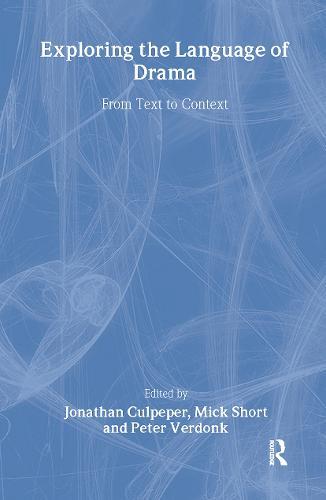Overview
Exploring the Language of Drama introduces students to the stylistic analysis of drama. Written in an engaging and accessible style, the contributors use techniques of language analysis, particularly from discourse analysis, cognitive linguistics and pragmatics, to explore the language of plays. Exploring the Language of Drama: * each chapter is summarized and has the follow-up exercises * offers practical advice on how to analyse a play extract and write it up as an assignment * includes contributions from some of the world's leading scholars in the field The contributors demonstrate the validity of analysing the text of a play, as opposed to focusing on performance. Divided into four broad, yet interconnecting groups, the chapters: * open up some of the basic mechanisms of conversation and show how they are used in dramatic dialogue * look at how discourse analysis and pragmatic theories can be used to help us understand characterization in dialogue * consider some of the cognitive patterns underlying dramatic discourse * focus on the notion of speech as action. Mick Short Lancaster University Vimala Herman University of Nottingham Paul Simpson Queen's University Marilyn M. Cooper Michigan Technological University Neil Bennison
Full Product Details
Author: Jonathan Culpeper , Mick Short , Peter Verdonk
Publisher: Taylor & Francis Ltd
Imprint: Routledge
Dimensions:
Width: 15.60cm
, Height: 2.00cm
, Length: 23.40cm
Weight: 0.426kg
ISBN: 9780415137942
ISBN 10: 0415137942
Pages: 192
Publication Date: 28 May 1998
Audience:
College/higher education
,
Tertiary & Higher Education
,
Undergraduate
Format: Hardback
Publisher's Status: Active
Availability: In Print 
This item will be ordered in for you from one of our suppliers. Upon receipt, we will promptly dispatch it out to you. For in store availability, please contact us.
Table of Contents
Notes on contributors, Acknowledgements, 1. Introduction, 2. From dramatic text to dramatic performance, 3. Turn management in drama, 4. Odd talk: studying discourses of incongruity, 5. Implicature, convention and The Taming of the Shrew, 6. Accessing character through conversation: Tom Stoppard’s Professional Foul, 7. (Im)politeness in dramatic dialogue, 8. ‘Catch[ing] the nearest way’: Macbeth and cognitive metaphor, 9. Three models of power in David Mamet’s Oleanna, 10. ‘Unhappy’ confessions in The Crucible: a pragmatic explanation, 11. The give and take of talk, and Caryl Churchill’s Cloud Nine, 12. Advice on doing your stylistics essay on a dramatic text: an example from Alan Ayckbourn’s The Revengers’ Comedies, Bibliography, Index
Reviews
Author Information
Based at the Department of Linguistics and Modern English Language, Lancaster University, Jonathan Culpeper is Lecturer and Mick Short is Professor of English Language and Literature. Peter Verdonk is Professor in the Department of English Language and Literature at the University of Amsterdam.
Tab Content 6
Author Website:
Countries Available
All regions
|



